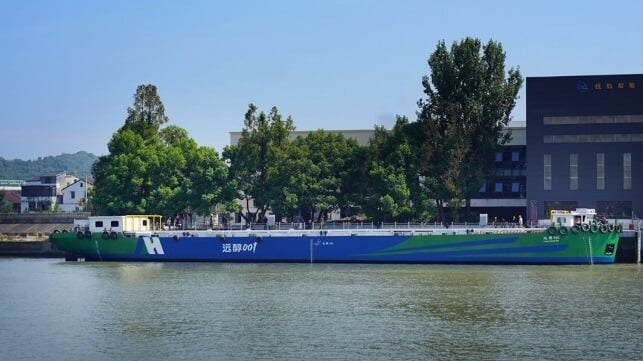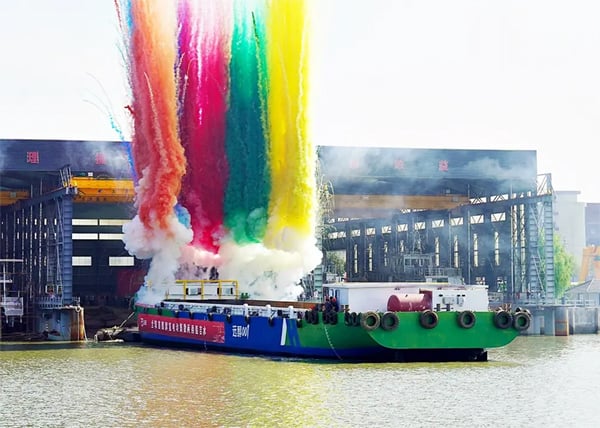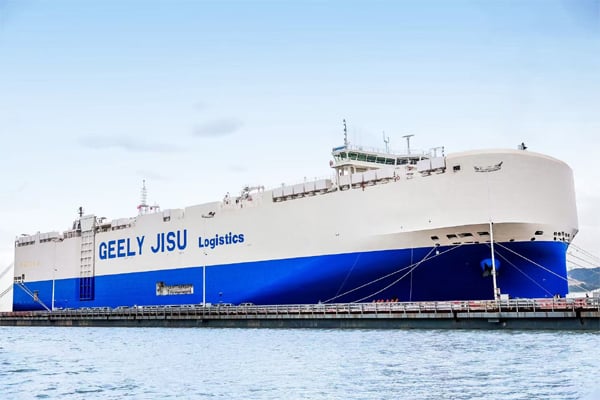China’s Geely Expands Methanol Technology with First Hybrid Hydrogen Barge

The first inland cargo barge that combines methanol and hydrogen electric for a more efficient operation was launched earlier this month in China. The vessel also represents an expansion of Chinese auto manufacturer Geely’s methanol technology into the maritime sector as the company looks to expand its international operations.
The barge, which has a capacity of 64 TEU, was launched on September 12 at the Hangzhou Qianhang Shipyard. It uses liquid methanol technology combined with alcohol-hydrogen electric technology. Geely reports that the technology has already been employed in over 50,000 hybrid electric vehicles on the road.
For the inland river vessel named Yuanchum 001, they have installed a 150kW dual motor. It is powered by two 280kW methanol generators and two 258kWh lithium batteries.
The design permits the vessel to operate in four different modes, and they report it will have a combined range of nearly 1,000 miles (1,500 km). Geely promotes that this will far exceed the 250 km range of the mainstream 3,000kWh class pure electric vessels being deployed today. China has invested in the development of electric inland shipping, including plans for recharging stations along the Yangtze River.
Yuanchum 001, they report will operate in the hybrid mode with the lithium batteries peak shaving during high-load, fast sailing, upstream, or when the vessel is heavily loaded. During long-distance sailing, the vessel switches to generator mode using the methanol generator set when battery charging is low. In ports and other environmentally sensitive areas, the vessel can operate fully in “pure electric mode.” While in port, it can also recharge its batteries from shore power. Geely reports the vessel will consume 42 percent less energy than similar diesel vessels.

Launch of the first hybrid methanol-hydrogen barge (Geely)
Geely has been developing methanol technology for 20 years and, through partnerships, is expanding to produce green methanol, carbon capture, methanol transportation, refueling, and various vehicle applications. It is successfully marketing passenger cars as well as long-distance trucking, urban delivery, construction vehicles, and public transportation using its methanol-hydrogen technology.
In the first half of 2025, the company reports it exported 180,000 vehicles, with pure electric vehicle shipments soaring over 300 percent versus 2024. It has expanded into international markets, including Australia, where it is introducing a new generation sedan, as well as Brazil and Poland. The company is targeting increased European sales.

Geely through its Jisu Logistics recently launched two PCTCs equipped to transport EV as well as hydrogen and natural-gas powered new energy vehicles (Geely)
To support the international growth, it is also investing in logistics, including in the maritime sector. In May 2025, Geely's first self-operated RoRo vehicle carrier, Jisu Fortune, sailed on its maiden voyage from China to European markets carrying 5,000 vehicles. Last week, on September 21, its second LNG-fueled PCTC, Jisu Glory, departed the Ningbo Zhoushan port carrying cars from five of the company’s brands bound for European markets, including the UK and Belgium.
The Jisu Glory has a capacity for 7,000 standard vehicles. It has 12 decks and was specifically designed to carry both traditional internal combustion engine vehicles and lithium-battery electric vehicles. On decks 11 and 12, the ship is specifically equipped to transport hydrogen and natural-gas powered new energy vehicles.
The company plans to continue to expand the applications of its methanol-hydrogen technology, including in the maritime sector. It will also strengthen the global supply chain through investments in maritime logistics.
